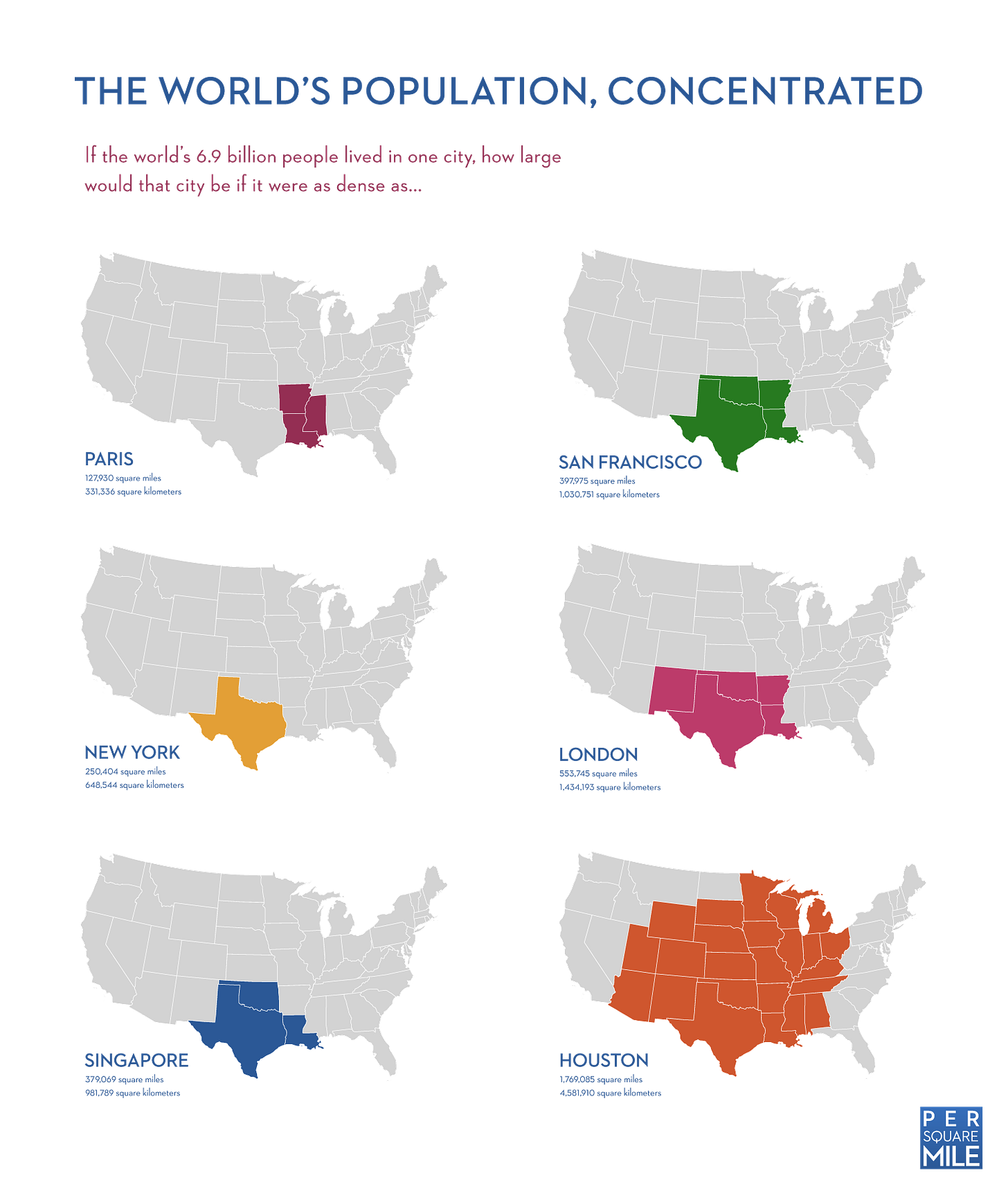JAWS ! ep. 4 : ”Too much humans on Earth”
Spoiler alert : Ricardo and Malthus’ predictions proved spectacularly wrong.
Image : https://persquaremile.com/wp-content/uploads/2011/01/the-worlds-population-concentrated.png
Article Source : https://www.epochtimes.fr/y-a-t-il-trop-de-gens-sur-terre-ou-pas-assez-2794034.html
Are There Too Many People on Earth or Not Enough?
By Mark Hendrickson - November 25, 2024
Are there really too many people on earth?
The world population first reached one billion around 1800. Two famous English economics writers lamented that the population had reached its limit. David Ricardo, with his “iron law of wages,” argued that any upward trend in population, in accordance with the inexorable law of supply and demand, would keep wages down, condemning workers to a grim level of subsistence income. His contemporary, the clergyman Thomas Robert Malthus, also believed that workers were doomed to abject poverty because of an inescapable mathematical reality: while the human population tends to increase geometrically, the production needed to sustain it can only increase arithmetically.
Ricardo and Malthus’ predictions proved spectacularly wrong. Thanks to unforeseen advances in science, technology, and economic production (improved hygiene, medical advances; improved tools, affordable and reliable energy; the emergence of mass markets), the world’s population grew to 1.5 billion by 1900. Workers, though much poorer than they are today, saw their standard of living improve modestly with each generation.
During the 20th century, the human population continued to increase—sometimes referred to as a “population explosion.” Not only did the population increase, but the standard of living of workers continued to rise in countries where various modern advances took hold. This new wealth was generally considered a blessing, even a miracle. Yet by the 1960s, there had been a backlash, and the gigantic economic advances that had transformed life on earth were being called into question. The modern world's new environmental movement was born.
A new green orthodoxy emerged, embodied in Paul Ehrlich’s best-selling book The Population Bomb, published in 1968. According to this orthodoxy, the population had reached its own limits and was in danger of mass starvation within a decade or two. It warned that the pollution generated by mass economic production would so damage the earth’s ecology that parts of the planet would become uninhabitable.
Activist groups like Zero Population Growth told students that making babies was environmentally irresponsible. Some of the more extreme “environmentalists” began calling human beings “viruses,” “diseases,” “vermin,” “cancers.” They said that “the extinction of the human species may not only be inevitable, it may also be a good thing,” or that “human beings, as a species, are no more valuable than slugs.”
However, just like Ricardo and Malthus in the 19th century, Ehrlich and the other neo-Malthusians (named after their precursor) were wrong in the 20th century. Humans turned out to be not a scourge on the planet, but its “ultimate resource,” as the economist Julian Simon put it. The human population (and, therefore, the pool of human talent) continued to grow; wealth continued to reach new heights and include ever-increasing numbers of people; and in addition, human beings (at least in democratic countries) invested part of their wealth in policies that both reduced and remedied pollution. As a result, these societies are much less polluted than they were 50 years ago.
Some countries have fallen behind in economic development, notably socialist regimes such as Cuba and Venezuela, and have impoverished their own populations through the economic underdevelopment they imposed on them. Overall, however, the trend of recent decades has been positive. In the mid-1970s, there were about 3.5 billion people on earth. Two billion of them were poor and hungry. Forty years later, there were 7.3 billion people, and only 767 million of them were in deep poverty. Thus, in less than two full generations, the proportion of people living in deep poverty has fallen from about five-ninths to one-ninth. Nothing like this enormous economic progress has ever happened before.
What now?
I recall a conversation with friends who were convinced that the explosion of the human population would ruin life on earth: I told them that capitalism was the cure for what they called overpopulation; that free and rational adults would voluntarily choose to have fewer children. They would not risk going from affluence to poverty.
And indeed, developed countries around the world are on the cusp of an era of population decline. Birth rates are well below replacement levels in all countries. Future projections now suggest a population implosion rather than an explosion. Will this be better or worse? According to some demographers, countries like China, Russia, South Korea, and most of Europe are headed, if not toward societal and political collapse, at least toward drastic retrenchment.
One of the next casualties of declining birth rates in advanced democracies like Japan and Western Europe is likely to be the concept of the modern welfare state. A population with a large number of elderly people may not have enough taxpayers to pay for the care they need, or even enough people to care for them.
Perhaps these elderly people will belatedly come to the conclusion that it would have been in their best interest to have more children.
This is a fascinating question, and one that will continue to be debated.






There are not too many normal behaving and consuming/exploiting humans on planet Earth but definitively too many power-hungry, narcissistic, sociopathic creatures in decision-making positions.
Fact too is, that a US standard of life is not sustainable for everybody ...
See above and as an example: average consumption of a random US-American is about 36 times higher that of an average Indian. Even when considering that for every US American there are 4 Indians, the disparity stays at about 9:1 and THAT is the "problem". Don't let us even talk about the figures for the hoi-polloi of the so-called "high-society" ...
Population growth is limited by nourishment. Our era is nourished on the oil of the earth. Never before has earth oil been used to feed a species. It is an extremely rich source of energy. People flourish.